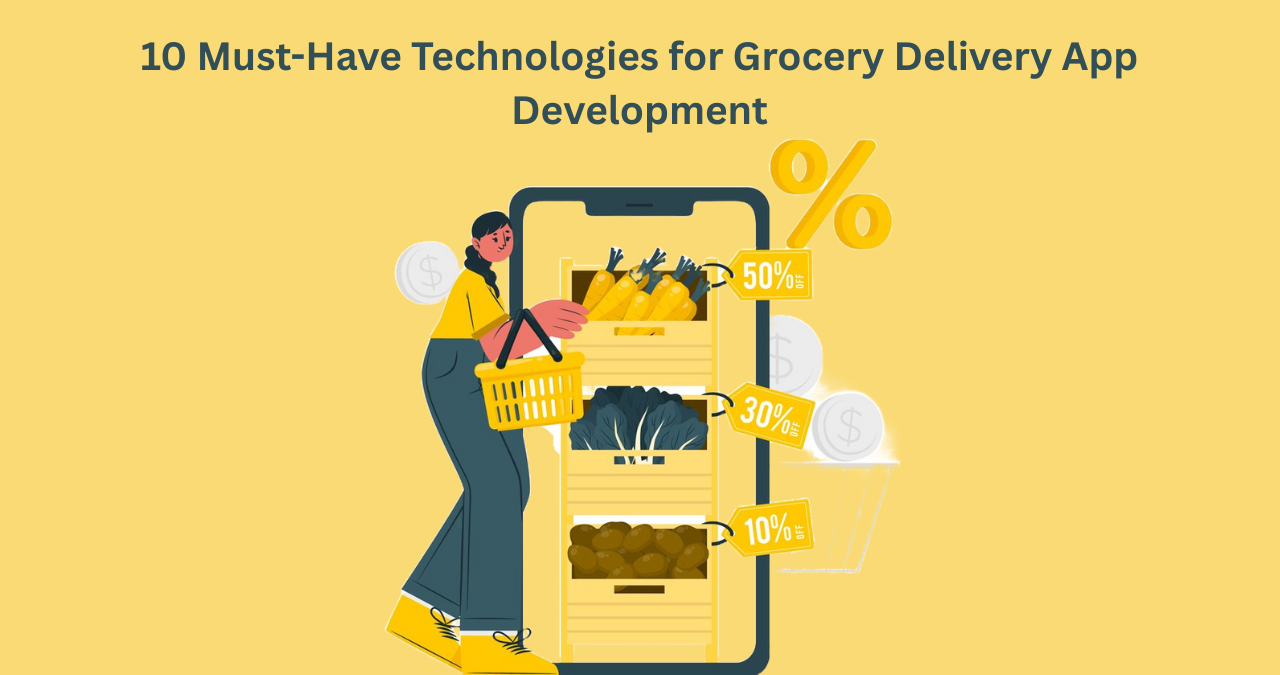Tech
10 Must-Have Technologies for Grocery Delivery App Development
The online grocery delivery business is growing fast. More people now prefer to order groceries from their phones instead of visiting physical stores. If you are planning to launch a grocery delivery app development, then just having a basic app is not enough. You need to use the right technologies to make the app user-friendly, fast, and secure.
In this blog, we will cover 10 must-have technologies that are important for building a successful grocery delivery app. These technologies help in improving user experience, managing operations, and making the app stand out in the competitive market.
1. GPS and Real-Time Location Tracking
Why it matters
This technology allows users to see where their delivery is in real-time. It also helps delivery drivers to find the best route to reach the customer faster.
How it helps
- Improves delivery accuracy
- Reduces delays
- Builds trust with users
GPS tracking also helps in estimating the delivery time, which makes users feel more in control.
2. Cloud Storage and Computing
Why it matters
A grocery app deals with a lot of data, like user accounts, product listings, order history, and more. Cloud technology helps store all this information safely without slowing down the app.
How it helps
- Scalable storage
- Fast access to data
- Secure and cost-effective
Cloud services like AWS, Google Cloud, and Microsoft Azure are commonly used.
3. Artificial Intelligence (AI)
Why it matters
AI makes the app smarter by learning user behavior and suggesting products based on their past purchases.
How it helps
- Personalized shopping experience
- Smarter search and product recommendations
- Efficient inventory and demand management
AI can also be used in chatbots for customer support.
4. Machine Learning (ML)
Why it matters
Machine learning works closely with AI and helps the system improve over time through data analysis.
How it helps
- Predicts what users may buy next
- Optimizes delivery schedules
- Detects fraud and unusual activities
ML helps the app get better with time, giving users a more accurate and smoother experience.
5. Payment Gateway Integration
Why it matters
Customers want a safe and easy way to pay for their orders. A reliable payment gateway helps process payments without errors or delays.
How it helps
- Supports multiple payment methods like UPI, cards, wallets
- Secure and encrypted transactions
- Fast checkouts
Popular gateways include Razorpay, Stripe, PayPal, and Paytm.
6. Chatbots and Virtual Assistants
Why it matters
Not every customer wants to make a phone call for help. Chatbots allow users to get quick answers inside the app.
How it helps
- 24/7 customer support
- Instant replies to common queries
- Reduces support team workload
Advanced bots can even help in placing orders and tracking deliveries.
Read More: Careem Clone App Development: Profitable Business Model for 2025
7. Push Notification Technology
Why it matters
Push notifications keep users updated about their orders, offers, and reminders.
How it helps
- Increases user engagement
- Improves app retention rate
- Promotes new deals and discounts
The key is to send useful and timely messages without being annoying.
8. Data Analytics and Reporting Tools
Why it matters
You need to understand how your app is performing. Data tools help track user behavior, order trends, and areas for improvement.
How it helps
- Tracks sales, traffic, and popular products
- Helps with future planning and marketing
- Identifies problems early
Google Analytics and in-app custom dashboards are good tools for this.
9. Inventory Management System
Why it matters
A grocery delivery app must always show correct stock levels. Nothing frustrates users more than ordering something only to find out it’s out of stock.
How it helps
- Real-time stock updates
- Alerts for low stock
- Avoids over-selling and shortages
This tech helps both the business and the customers stay on the same page.
10. Augmented Reality (AR) and Visual Search (Optional Advanced Tech)
Why it matters
While not yet common in all grocery apps, AR and visual search are becoming more popular.
How it helps
- Users can scan a product to find it online
- AR helps in giving a virtual look at items (especially useful for packaged or new products)
- Offers a fun and interactive shopping experience
This is a future-ready feature that can give your app an edge over competitors.

Conclusion
Creating a grocery delivery app is not just about listing products and taking orders. It’s about using the right mix of technologies to make the entire experience smooth, quick, and satisfying for the customer. Each of the 10 technologies mentioned above plays a specific role in building a powerful and user-friendly app.
From GPS and real-time tracking to AI, payment security, and data analytics — all of these features come together to make the app useful and scalable. Depending on your business size and goals, you can even include extra technologies like AR and voice search to stand out from the crowd.
If you’re planning to step into this fast-growing market, it’s important to partner with a trusted on-demand mobile app development company. An experienced team can guide you on which technologies to use, how to integrate them properly, and how to scale as your business grows.
With the right strategy, features, and technology, your grocery delivery app can become a daily habit for customers and a successful digital asset for your business.

